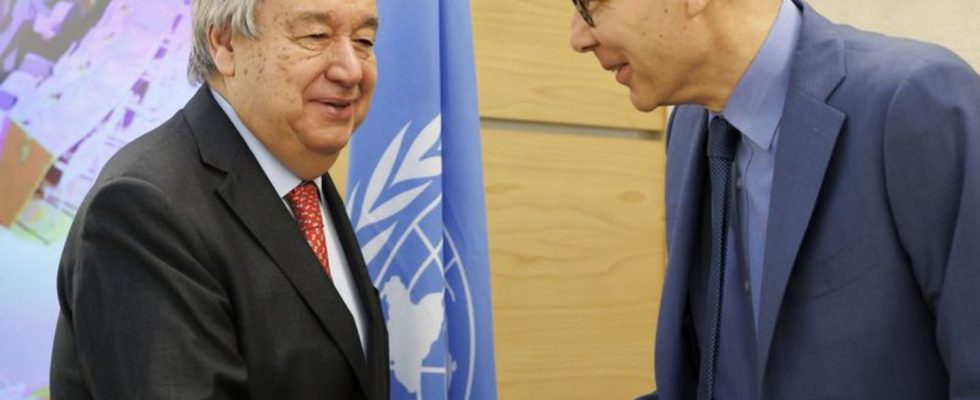Spring meeting in Geneva
“Seismic global shocks”: UN Human Rights Council meets
UN Secretary General António Guterres (l) and the UN High Commissioner for Human Rights, Volker Türk, welcome each other in Geneva. photo
© Salvatore Di Nolfi/KEYSTONE/dpa
Ukraine, Gaza Strip, Sudan: just a few of the many conflicts that are currently throwing the world out of balance are raging there. Foreign Minister Baerbock also wants to address another country.
Wars, conflicts and tensions are the focus of the opening of the spring session of the UN Human Rights Council. The UN High Commissioner for Human Rights, Volker Türk, spoke in Geneva of “seismic global shocks”. “The pain and slaughter of so many people in the Middle East, Ukraine, Sudan, Myanmar, Haiti and so many other places around the world is unbearable,” Turk said. He used the word “slaughter” in his speech, which was given in English.
UN Secretary-General António Guterres spoke of a dangerous drifting apart of the world into rival power blocs. He called on the global community to come together instead of giving room to hatred and trampling on human rights. Difficult times also presented opportunities to show leadership and give justice a central place on the international stage. International humanitarian law, which applies worldwide and sets guidelines for behavior in conflicts and protects civilians, must be respected again. It was created from a clear realization: “Terrorizing a civilian population (…) is a recipe for endless anger, alienation, extremism and conflict.”
The situation in Gaza does not make the situation in the UN Human Rights Council any easier
The constellation in the Human Rights Council with 47 rotating member countries is difficult from the perspective of Western countries. For many, the situation in the Gaza Strip is the overriding issue. Some accuse Western states of using different standards: for example, they denounced oppression by the leadership of the Islamic Republic in Iran, but did not take sufficient account of human rights violations against the Muslim population of the Gaza Strip. Western countries reject this. In his opening speech, Guterres emphasized that there should be no double standards.
With a view to the conflict in the Gaza Strip, Guterres once again warned urgently against an Israeli offensive in the city of Rafah in the south of the coastal region. “A full-scale Israeli offensive on the city would not only be terrible for the more than one million Palestinian civilians sheltering there, but would also put the final nail in the coffin of our aid programs,” he said.
Guterres condemned the October 7 terrorist attacks by extremist Palestinians in Israel and Israel’s military response to them. Nothing can justify the killing, wounding, torturing and kidnapping of civilians and the use of sexual violence, he said. “And nothing can justify the collective punishment of the Palestinian people,” said Guterres.
Baerbock is calling for the investigation into Iran to be extended
Federal Foreign Minister Annalena Baerbock also wanted to take part in the opening meeting. Before her departure, she warned against losing sight of the human rights situation in Iran, for example, given the current wars in the Middle East and Ukraine. “For far too many people around the world, the promise of the Universal Declaration of Human Rights has not been fulfilled even after 75 years,” said the Green politician. “The fact that this is becoming visible under the magnifying glass at the Human Rights Council in Geneva is a great achievement,” she added.
“Especially in a world full of crises and conflicts, this magnifying glass must not become cloudy,” demanded Baerbock. Rather, it must “remain clear and be able to illuminate where no one else looks – in Iran and other places in the world.” That’s what she’s committed to and that’s why “we in the Human Rights Council will always listen, raise our voices, call out injustice and demand accountability – for every person in the world.”
It was said from Berlin that Baerbock wanted to address the situation in Iran, among other things, in Geneva. Germany enforced an investigation in November 2022 after the suppression of anti-government protests in Tehran. A group of experts is now presenting its report, which is expected to be debated on March 15th. Baerbock is campaigning to extend the group’s mandate. Iran refused to cooperate with the appointed experts.
The 47 countries are elected to the UN Human Rights Council by the UN General Assembly for three years each. Germany is currently there. All countries can be brought up and speak there, but only the members can vote on resolutions. This happens towards the end of the session, which lasts until April 5th.

